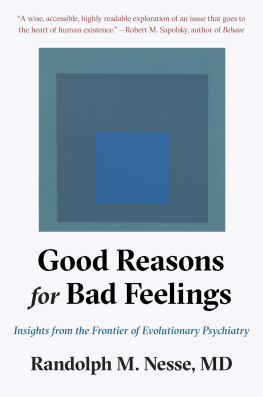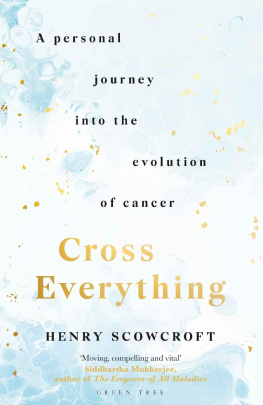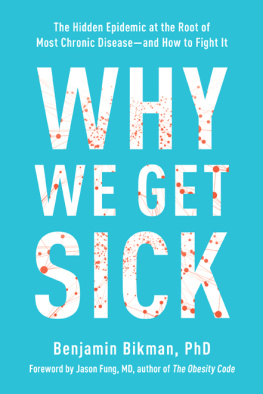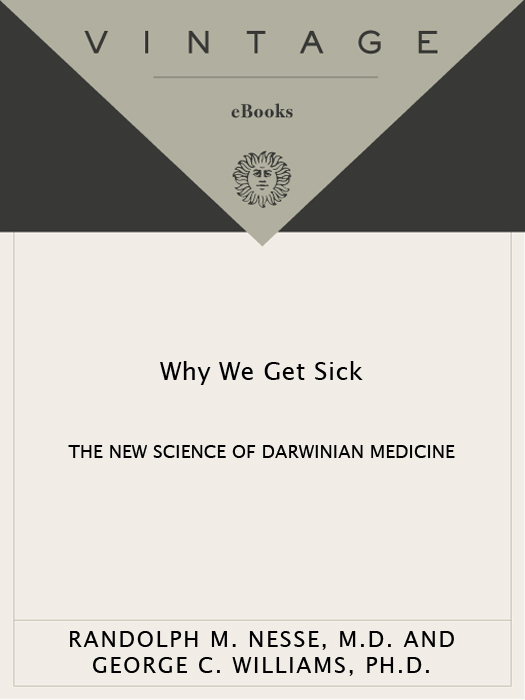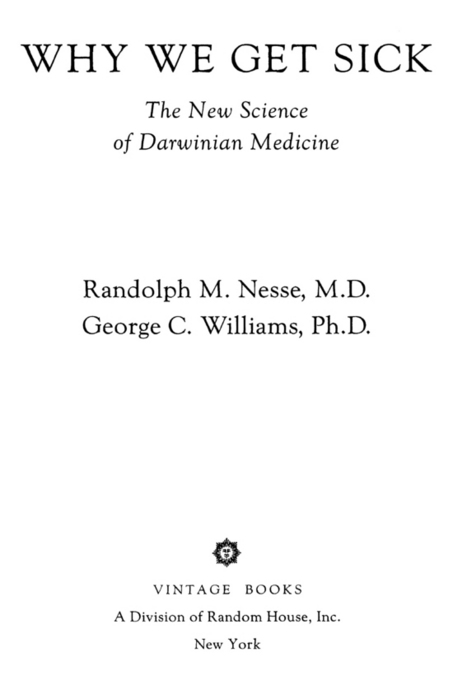Acclaim for
Randolph ML Nesse and George C. Williamss
WHY WE GET SICK
This is the most important book written about issues in biomedicine in the last fifty years. When the worlds leading evolutionary biologist (Williams) teams up with a thoughtful physician (Nesse), the product is a gripping exploration of why our bodies respond the way they do to injury and disease.
Michael S. Gazzaniga, Ph.D.,
director, Center for Neuroscience,
University of California at Davis
Darwinian medicine holds that there are evolutionary explanations for human disease and physical frailties, just as for everything else in biology, and that these insights can inspire better treatments. In Why We Get Sick two proponents of Darwinian medicine lay out the ambitious reach of the adventurous new discipline.
The New York Times Magazine
Every so often, a book comes along that has the power to change the way we live and die. This splendid book is one, and it could well revolutionize the way physicians are taught, the way they practice, and even the way parents watch over their child with a fever or a cough.
Professor Robert Ornstein,
author of The Psychology of Consciousness
Would you accept that eating certain kinds of red meat could help ward off heart attacks? That taking aspirin when you are sick could make things worse? That mothers should sleep right next to their infants to prevent sudden infant death? You might after hearing how your prehistoric ancestors lived, according to a small but growing tribe of Darwinian medicine thinkers. They argue that for too long physicians have ignored the forces that shaped us over evolutionary eons. Such ideas are controversial, but thats the point.
Wall Street Journal
Why We Get Sick is certain to be recognized as one of the most important books of the decade, and whats more, its beautifully written.
Roger Lewin,
author of Human Evolution, 3rd Edition
Why We Get Sick offers both a provocative challenge to medicine and a thoughtful discussion of how evolutionary theory applies to people.
Business Week
Randolph M. Nesse, M.D.
George C. Williams, Ph.D.
WHY WE GET SICK
Randolph M. Nesse, M.D., is a practicing physician and professor and associate chair for education and academic affairs in the Department of Psychiatry at the University of Michigan Medical School.
George C. Williams, Ph.D., is a professor emeritus of ecology and evolution at the State University at Stony Brook and editor of The Quarterly Review of Biology.
FIRST VINTAGE BOOKS EDITION, JANUARY 1996
Copyright 1994 by Randolph M. Nesse, M.D., and George C. Williams, Ph.D.
All rights reserved under International and Pan-American Copyright Conventions. Published in the United States by Vintage Books, a division of Random House, Inc., New York, and simultaneously in Canada by Random House of Canada Limited, Toronto. Originally published in hardcover by Times Books, a division of Random House, Inc., New York, in 1995.
Grateful acknowledgment is made to the following for permission to reprint previously published material:
Lawrence M. Crapo and James F. Fries, M.D.: Two charts from Vitality and Aging by Lawrence M. Crapo and James F. Fries, M.D.
(W. H. Freeman & Company, San Francisco, 1981).
Reprinted by permission.
Harcourt Brace &. Company: Chart 12-1 from Life: An Introduction to Biology by George C. Simpson, Colin S. Pittendrigh, and Lewis H. Tiffany. Copyright 1957 by George C. Simpson, Colin S. Pittendrigh, and Lewis H. Tiffany. Copyright renewed 1985 by Anne R. Simpson, Joan Simpson Burns, Ralph Tiffany, Helen Vishniac, and Elizabeth Leonie S. Wurr. Reprinted by permission of Harcourt Brace & Company.
The Library of Congress has cataloged the Times Books edition as follows: Nesse, Randolph M.
Why we get sick: the new science of Darwinian medicine Randolph M. Nesse and George C. Williams.1st ed.
p. cm.
1. MedicinePhilosophy. 2. Human evolution.
3. Human biology. 4. Adaptation (Physiology)
I. Williams, George C. (George Christopher), 1926 II. Title.
R723.N387 1995
610.1-dc20 94-27651
eISBN: 978-0-307-81600-9
Illustrations by Jared M. Brown
v3.1
A CKNOWLEDGMENTS
O ur work has benefited enormously from comments made by many colleagues and friends who know more than we do about certain aspects of medicine and evolution. We have not always had the sense to take their advice, so dont blame them for our mistakes. Among those who have offered comments or other suggestions on the manuscript are: James Abelson, M.D., Ph.D., Laura Betzig, Ph.D., Helena Cronin, Ph.D., Lyubica Dabich, M.D., Wayne Davis, Ph.D., William Ensminger, M.D., Paul Ewald, Ph.D., Joseph Fantone, M.D., Rosalind Fantone, R.N., Robert Fekety, M.D., Linda Garfield, M.D., Robert Green, M.D., Daniel Hrdy, M.D., Sarah Hrdy, Ph.D., Matt Kluger, Ph.D., Isaac Marks, M.D., Steven Myers, M.D., James Neel, M.D., Ph.D., Margie Profet, M.A., Robert Smuts, M.A., William Soloman, M.D., Paul Turke, Ph.D., Alan Weder, M.D., Brant Wenegrat, M.D., and Elizabeth Young, M.D. For help in finding references we especially thank Doris Williams, Jeanette Underhill, M.D., and Joann Tobin. A sabbatical provided by The University of Michigan with support from John Greden, M.D., and George Curtis, M.D., made it possible for Randolph Nesse to work on the manuscript at Stanford University, where Brant Wenegrat, M.D., and Anne OReilly offered hospitality beyond measure. Barbara Polcyns loyal and effective secretarial support was wonderful. We are grateful to our agent, John Brockman, for convincing us that we could present serious new science in a book for a general audience and for handling negotiations and publishing details with great effectiveness, and to Barbara Williams for persuading us to take John Brockman seriously. The style and structure of the book are much improved thanks to detailed editing by Margaret Nesse and by our editor at Times Books, Elizabeth Rapoport.
Our greatest debt is to those who made us realize that we had a reason to write this book. They are the pioneers and visionaries whose ideas and investigations form the heart of the now flourishing field of Darwinian medicine. Some, like Paul Ewald and Margie Profet, figure prominently in several places in our text. Others are mentioned more briefly or merely have their publications listed in our endnotes. We are confident that, over the next few years, they will all be getting growing shares of the recognition they richly deserve.
C ONTENTS
P REFACE
W e first met and discovered our shared interests in 1985 at a meeting of a group that later developed into the Human Behavior and Evolution Society. One of us (Nesse) was a physician in the Department of Psychiatry at the University of Michigan Medical School. Frustration with psychiatrys lack of theoretical foundation and fascination with the extraordinary progress that evolutionary ideas had brought to the field of animal behavior had led to his association with the University of Michigan Evolution and Human Behavior Program. Colleagues in that interdisciplinary group, on hearing about his long-term interest in the evolutionary origins of aging, suggested a 1957 paper by a biologist named George Williams. The paper was a revelation. Aging had an evolutionary explanation. Why not anxiety disorders or schizophrenia? Thanks to subsequent years of conversations with evolutionists, especially Williams, and with medical school residents and faculty, he has found that an evolutionary perspective on patients disorders has become steadily more natural and useful.


